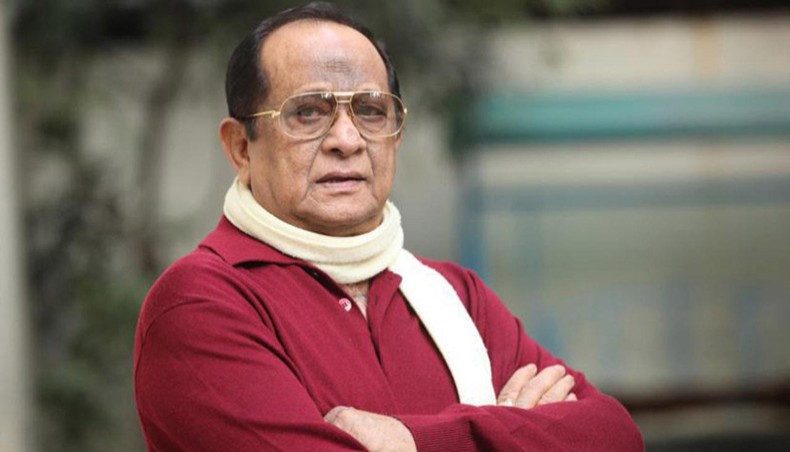By: Udayan Namboodiri
 His career as a romance hero was long over, but Indians from all walks of life were swept with nostalgia at the death of screen legend Rajesh Khanna, who passed away after a long illness at his home in Mumbai on Wednesday (July 18th). He was 69.
His career as a romance hero was long over, but Indians from all walks of life were swept with nostalgia at the death of screen legend Rajesh Khanna, who passed away after a long illness at his home in Mumbai on Wednesday (July 18th). He was 69.
“He was Bollywood’s first superstar and his legacy is alive in the movies made all over the sub-continent,” Mahesh Bhatt, a leading contemporary director, commented to Khabar South Asia.
Hundreds of thousands of people followed his hearse to the Ville Parle crematorium in south Mumbai on Thursday. A heavy monsoon downpour did not deter even reigning film stars from following the flower-bedecked funerary vehicle.
Khanna’s contemporary, Hindi moviedom’s greatest ever star, Amitabh Bachchan, was in the crowd along with his son, present-day star Abhishek.
Khanna’s nine-year-old grandson, Aarav, the son of his daughter Twinkle, lit the funeral pyre in line with orthodox Hindu rites.
Tributes poured in from people in all walks of life. While Indian Prime Minister Manmohan Singh wrote a letter to the bereaved family, Pakistan’s Prime Minister Raja Pervez Ashraf sent a message describing Khanna as “a great actor whose contribution to films and the arts would always be remembered”.
Practically the entire film industry shut down for a day of mourning, while India’s TV channels conducted non-stop interviews of people on the street on their impressions of the great actor’s life and times.
“Last romantic hero”
Born in the town of Burewala in present-day Pakistan, Khanna showed an early aptitude for showbiz, featuring in amateur theatre while a student in Mumbai.
In a country where arranged marriages along caste lines and heavily leveraged by dowry are the norm, Rajesh Khanna personified a romantic ideal.
“Boys and girls even today don’t meet before marriage, to say nothing of the 1970s when Rajesh burst upon the scene. But he stimulated the innate curiosity for true love which lives in every young heart,” said film critic Maya Rangarajan of Cine Blitz magazine.
“Indian films, with notable exceptions, are essentially boy-meets-girl affairs ending in big weddings. But Rajesh Khanna had the capacity to convey the complications of love – he sent the message that true love comes with the baggage of pain and sacrifice,” Ranjit Mankekar, a Marathi author of five books on Bollywood history, commented to Khabar.
Khanna paired with the leading ladies of the era – Nanda, Sharmila Tagore, Zeenat Aman, Hema Malini, Tanuja, Waheeda Rahman, and, most importantly, Mumtaz, with whom he enjoyed eight “superhit” films in the early 1970s.
In Hrikikesh Mukherjee’s Anand (“Joy”, 1971), he played one of the most memorable roles in Indian cinema history: a young medical student suffering terminal cancer. Like all Hindi movies, Anand had songs. The one featuring him walking down Mumbai’s Chowpatty beach singing Zindagi, kaisi hai paheli (“The Riddle of Life”, sung playback by Manna Dey) is considered by many as one of the greatest song scenes of all time.
Khanna acted in 163 films beginning with Aakhri Khat (“The Last Letter”, 1966), but failed to make a mark before 1969, which was his breakthrough year. In Aradhana (“Glory”, 1969) he starred opposite reigning Bollywood siren Sharmila Tagore. The movie was one of the biggest hits of all time. It featured him in a double role – first as an air force pilot who romances Tagore, then as his son who lives up to his father’s ideal.
In Mumtaz, Khanna found his ultimate screen opposite. “With Mumtaz there was an on-screen chemistry which was not repeated with the other heroines of the era,” recalled Bhatt.
The two starred in Bandhan (Ties, 1969), Do Raaste (Two Roads, 1969), Sachha Jhutha (Truth and Falsehood, 1970), Dushman (Enemy, 1972), Apna Desh (Your Country, 1972), Aap Ki Kasam (Yours Truly, 1973), Roti (Bread, 1974) and Aaina (Mirror, 1977).
“I guess what made us click with the masses of filmgoers was our freshness. Both Rajesh and I were struggling to find our feet in the industry and so we put in our best. Most of his other heroines were already established stars,” Mumtaz reminisced on the news channel NDTV.
“Rajesh Khanna did not have a machismo appeal; he was soft, sensitive, almost the boy next door”, said Bhatt, describing the charisma of the star. “He was the last romantic hero; after him began the age of action heroes, the biggest of whom was Amitabh Bachchan.”
Bachchan, who is a sort of cult figure for Indian movie lovers, co-starred with Khanna in Anand and Namak Haram (“Traitor”, 1975). “Even today the debate goes on over who made the bigger impact in those two films. Most would vote Rajesh,” added Bhatt.
Stormy life
But unlike Bachchan, whose personal life mirrored the stability most Indians cherish, Khanna’s off-screen life was turbulent.
“He had numerous affairs with co-stars and models. His 1973 marriage to Dimple Kapadia, a teenage star reportedly 15 years his junior, was controversial throughout its 12-year length. Most tragically, he had a drinking habit which ruined his relationship with the film industry,” author Mankekar told Khabar.
In 1985, his marriage foundered when Dimple walked out to resume her career, which had been truncated after her only film, Bobby (1974). Khanna was rumoured to have forced her to live the life of a typical Indian housewife, while he led a bohemian lifestyle that ultimately took a toll on his health.
However, Dimple and Rajesh never formally separated. The two lived apart until the early 2000s and later “came to an understanding”, according to industry sources. She was by his side throughout the period of his long illness, which culminated in death.
The saga of Rajesh Khanna even includes a political stint. In 1991 he contested elections to the Parliament from New Delhi as a candidate of the Congress Party, which was then led by the late Rajiv Gandhi. He lost narrowly to the leading Hindu nationalist leader of the era, L.K. Advani of the Bharatiya Janata Party, but bounced back soon afterwards to win a by-election.
Mamata Banerjee, the present Chief Minister of West Bengal, who was then a junior Member of Parliament, recalled to Press Trust of India (PTI) her memories of Khanna as a parliamentarian. “He was a genuine person and quite articulate on issues concerning the common man. He also liked to debate national developments with leaders from all parties.”
Source: Khabar south Asia









